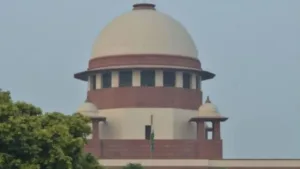
INDEPENDENCE LURED TO BAIT: - EXTENSION OF ED’S BY ONE YEAR AT A TIME

The head of the government has been turmoiled in a very long political controversy over its decision to extend Enforcement Directorate’s Director S.K Mishra’s tenure, he was first appointed in 2018 and was legitimately supposed to be retired with the time span of two years at the age of 60.
However in 2020 the government revised the order and gave the extension for two years though the Supreme court investigated and made an exception that under a very rare case only it was possible and the apex court made it clear to not use any further extensions to the Enforcement Directorate’s; but in 2021,
Just before his tenure was about to end president promulgated two ordinances amending the Delhi Special Police Establishment Act of 1946 and the Central Vigilance Act of 2003 sooner these bills were even passed with the majority in the parliament and on the basis of these the tenure of both the CBI and ED could be extended to a total of five years each by one year and now this was to be challenged in the court
The strategy of providing with the extent of one year at a time to the chiefs of investigating agencies put danger the independence of the institutions as the Enforcement Directorate that either will be lured to have or will be spellbound to deal with their duties and responsibilities towards the end of their official tenure to catch hold the extension.
This petition is filed by senior advocate Gopal Sankaranarayanan. Three benches of justice BR Gavai, Vikram Nath, Sanjay Karol. The extent of the tenure was for the third time to Enforcement Directorate’s director S.K Mishra. He concluded that the only problem is it’s not independent.
Senior advocate Abhishek Manu Singhvi stated loud and clear that a situation like this introduces an apprenticeship example of the fixity of tenure. The authority must be performing according to the government’s will and only then the extent of the tenure would be gifted to them, so it somehow in one or another other way curbs the independent nature of the Enforcement authorities and it erodes the concept of neutrality to the posts and the contingent of their performances.

Amicus curiae state this to just not be unauthorized but up to an extent it is also illegal. It states in its direct words that “MEN AND WOMEN MAY COME ANG GO, BUT THE INSTITUTION SHOULD GO ON FOREVER.” It was stated to make a very crucial understanding of the independence of the institutions.
The court was taken to the dilemma of judgments in an effort to convince them not only for extensions but also for the 2021 amendment to the Central Vigilance Commission Act, 2003 enabling the central government to extend the tenure total of five years one by each.
Landmark Cases in ED
In the judgment from VINNET NARAIN I, PRAKASH SINGH II, COMMON CAUSE I AND COMMON CAUSE II state that it was not about a particular political property or not even to the ruling party but the extensions of the tenure and amendments are foul play for the law.
In multiple judgments, the independence of the institution has been given very prior importance as it is a very eminent part of democracy and democratic interests and these agencies give the perception of independence so any sort of pressure whether persuasive or of luring is not justified.
It further states that the very purpose of its establishment will go all purposeless if the meant-to-be independent Directorates start dancing to the tunes of the government said by advocate Prashant Bhushan and by them it was seen as to be more vaguely misused in the future references. The counter affidavit filed for this was that it does not have any locus standi and whoever filed the petition was of the political parties of the opposition and were of complete political agendas itself.
Many arguments and counter-arguments are been drawn for this particular case regarding whether the extension is justifiable or not but one thing that must be kept while taking any step should be that India is a democratic nation and its dignity lies in this democracy and democracy ensures the independence of the agencies so not curbing their freedom for the selfish motives must be a point to be noted.








